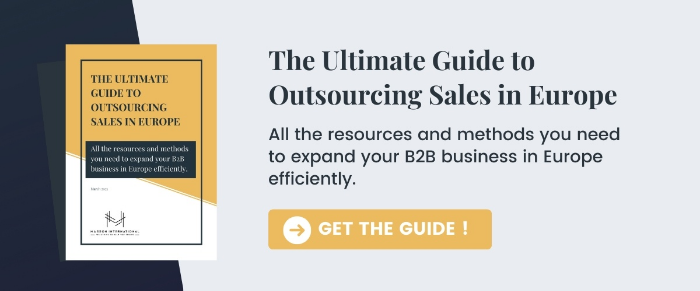Summary
Mistake 1 : Underestimating Cultural & Market Diversity in Europe
Mistake 2 : Ignoring Local Regulations and Compliance Rules
Mistake 3 : Skipping Market Research or Misreading the Data
Mistake 4 : Picking the Wrong Local Partners
Mistake 5 : Using a One-Size-Fits-All Market Entry Strategy
Mistake 6 : Misjudging the Competition
Mistake 7 : Not Adapting Your Business Model
Mistake 8 : Forgetting to Integrate Local Talent
International Business Strategy: FAQs
Expanding into Europe sounds exciting — and it is. But it’s also one of the most complex business environments in the world.
Whether you’re entering one country or several, the success of your international business strategy will depend on your ability to adapt to local realities, avoid costly missteps, and stay flexible.
In this guide, we break down the 8 most common mistakes companies make — and how you can avoid them to build a smarter, more effective international expansion plan.
1. Underestimating Cultural & Market Diversity in Europe
One of the most critical mistakes companies make when entering the European market is underestimating its cultural and market diversity.
Ignoring local consumer behaviors and preferences
Europe is a collection of countries, each with distinct cultures, languages, and consumer behaviors. Companies often make the mistake of applying a one-size-fits-all strategy across the continent. This approach fails to recognize these critical differences.
For example, a marketing message that works well in Germany may not have the same impact in Italy or Spain. So, it’s imperative to understand and adapt to these local preferences to be successful.
Failure to adapt marketing and product offerings
Tailoring marketing strategies and product offerings to fit local tastes and standards is also necessary.
A product that performs well in the United States may need to be significantly modified to meet the expectations of European consumers.
This adaptation can involve altering packaging. It may involve changing product features or adjusting pricing strategies to align with local purchasing power.
2. Ignoring Local Regulations and Compliance Rules
Another significant error companies make is neglecting the local regulations and standards that vary across European countries.
Overlooking the EU's complex regulatory environment
European business regulations are complex, and successfully navigating them is crucial. Getting good legal advice is imperative for smooth sailing. The European Union (EU) has a rigorous regulatory framework governing various aspects of business operations. These include product safety, environmental standards, and consumer rights.
Companies that fail to comply with these regulations can face hefty fines and legal challenges.
Compliance issues with local trade laws, labor laws, and data protection
Beyond EU regulations, individual European countries have their own sets of trade laws, labor regulations, and data protection rules. For instance, the General Data Protection Regulation (GDPR) adopted in 2016, imposes strict requirements on how companies handle personal data.
Businesses must ensure they fully comply with EU Trade compliance as well as country-specific regulations to avoid legal issues and build trust with local stakeholders.
If you plan to work with European distributors, know that various country-specific regulations protect distributors and sales agents. It’s essential to seek legal counsel to learn about the local laws before signing a contract in an EU country.
3. Skipping Market Research or Misreading the Data
Insufficient market research can significantly impact your business strategy and market entry endeavors.
Skipping comprehensive market analysis
While the idea of expanding a business into new waters is incredibly tempting, you can’t overlook the importance of thorough market research. It’s the backbone of any successful market entry strategy.
Ask key questions: How do competitors market ? What do prospects seek & how can we engage them effectively ?
Companies often rush into new markets without conducting comprehensive market research, including adapting products for Europe. This leads to a lack of understanding of market dynamics, customer needs, and competitive landscapes.
Effective European market analysis should detail market size, growth potential, customer demographics, and key competitors.
Misinterpreting market data and trends
Even when market research is conducted, there’s a risk of misinterpreting the data. Businesses must distinguish between superficial data trends and deeper insights that reveal true market opportunities.
Lack of understanding can lead to flawed strategic decisions.
Utilizing local expertise and reliable market research firms can help correctly interpret market data and trends.
4. Picking the Wrong Local Partners
Choosing European business partners and distributors are vital for establishing a strong market presence.
Selecting partners without sufficient vetting
Selecting the right local partners is key for successful global growth.
They assist with cultural, legal, and business aspects in new markets. Poor choices can result in inefficiencies, brand damage, and reduced customer satisfaction.
Mistrust or conflict can also distract from growth efforts. So, it's important to thoroughly vet potential partners to ensure they have the necessary capabilities and alignment with your business values and goals.
Want to avoid these mistakes in your expansion?
Let’s review your current strategy and make sure you’re set up for success.
👉 Schedule a call
Underestimating the importance of local knowledge and networks
Local partners bring invaluable insights and connections that can greatly enhance your market entry strategy. They can help navigate local business practices, consumer preferences, and regulatory environments more effectively.
So, don’t underestimate the value of these local networks, as you’ll hinder your ability to establish a strong market presence.
And if you want to go even further, download our complete guide to finding a distributor in europe.
5. Using a One-Size-Fits-All Market Entry Strategy
Relying on a single market entry strategy can limit your potential for growth and adaptability.
Limiting expansion to one entry mode such as exporting
Relying solely on one market entry strategy, such as exporting, can limit a company's growth potential in Europe. Different markets may require different approaches. One example would be franchising, and another would be opening your European subsidiary.
By exploring multiple entry strategies, businesses can better adapt to local conditions and optimize their market presence.
Not considering alternative strategies like joint ventures or direct investment
Joint ventures and direct investments are often more resource-intensive but can provide deeper market penetration and control. These strategies can be particularly effective in countries with high entry barriers or complex regulatory environments.
Evaluating the benefits and risks of various entry strategies is essential for long-term success.
6. Misjudging the Competition
Misjudging the competitive dynamics in European markets can lead to ineffective positioning and strategic decisions.
Underestimating local and international competitors
The competitive landscape in Europe is highly dynamic. Both local and international players vie for market share. Most European markets are mature, and many local competitors have been established for a long time.
Stealing market shares from them will be extremely difficult if your products or services aren’t differentiating. You need not to underestimate that. Companies often underestimate the strength and strategies of their competitors, leading to inadequate competitive positioning.
So, a thorough competitive analysis is important to identify key competitors and understand their strengths and weaknesses. Developing a solid competitive strategy in Europe is also necessary to differentiate your brand effectively.
To find out more :
Selling SaaS? Everything you need to know about this sector when exporting your SaaS sales team to Europe.
Failing to position the brand effectively against competitors
Effective brand positioning involves highlighting your unique value proposition and addressing the specific needs and preferences of the local market. If you fail to do this, your brand may be overshadowed by more established local or international competitors.
Crafting a compelling and locally relevant brand message is crucial for capturing market attention and loyalty.
7. Not Adapting Your Business Model
Failing to adapt your business model to local conditions can significantly hinder your success in Europe.
Rigid adherence to domestic business models
A common mistake is rigidly applying domestic business models to the European context.
As mentioned above, what works in one country may not necessarily work in another. This may be due to differences in business practices, consumer behavior, and regulatory requirements.
So, flexibility in adapting your business model to suit local conditions is key to success.
Not tailoring business strategies to accommodate local business practices
Each European market has its own business customs and practices. Companies that fail to tailor their strategies to accommodate these local practices may struggle to establish effective operations. This can include adapting sales techniques, marketing approaches, and customer service standards to meet local expectations.
8. Forgetting to Integrate Local Talent
Integrating local talent into your business operations is essential for navigating the European market effectively.
Not hiring local experts or integrating local staff into leadership roles
While you may have ample experience in your local market, it's crucial to account for cultural nuances, language barriers, and time variations when expanding your business.
The key is collaborating with a seasoned organization well-versed in all European markets, particularly within the sales and marketing divisions.
Cultural differences in business significantly impact outcomes – what resonates in the American market may not in Europe. Localizing business in Europe requires familiarity with local languages, communication norms, and regulations.
Integrating local experts into leadership teams helps align the company's strategic objectives with local market realities, fostering better understanding and connection.
Ignoring the benefits of diverse and culturally informed perspectives
Diverse teams with local talent bring a wealth of culturally informed perspectives that can enhance decision-making and innovation.
Ignoring these benefits can result in strategies that are out of touch with local market needs and opportunities. Embracing diversity and inclusion in your European operations can drive better business outcomes.
Check out these tips for a successful international sales strategy.

Conclusion
While expanding into the European market presents significant opportunities for growth, it also comes with challenges that require careful planning and execution. By avoiding these common mistakes, businesses can enhance their strategic approaches and increase their chances of success.
Flexibility, local knowledge, and a deep understanding of market dynamics are essential to a successful international business strategy in Europe.
An international business strategy is only as strong as its local execution.
Let’s build a plan that works — and wins — in Europe.
👉 Talk to an expert
International Business Strategy: FAQs
What makes a successful international business strategy?
It’s a strategy that adapts to local markets, includes proper research, respects regulations, and leverages local partnerships and talent.
What are the biggest risks when expanding into Europe?
Cultural misalignment, regulatory non-compliance, poor local partnerships, and rigid business models are the top risks
How do I know if my strategy is ready for Europe?
If you’ve validated demand, localized your approach, and prepared operationally and legally, you’re on the right path.






